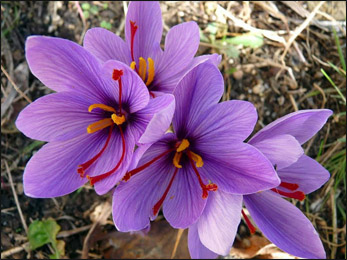What are the Uses and Health Benefits of Saffron (Kesar, Crocus Sativus)?

What is Saffron (Kesar)?
The Latin name of this herb is Crocus sativus. It is a flowering perennial herb commonly known as autumn crocus or saffron crocus. According to morphology this herb have corm that holds bracts, bracteole, flowering stalk, and leaves.
The purple flowers of this herb blooms in the autumn. This plant grows to 10 to 30 cm in height. Kesar flowers have good fragrance with stigma having reddish orange color. The thread like parts of the flower known as dried stigmas are used to make spice.
Kesar herb is known to grown in East Asia, Mediterranean, Eastern Greece, Western or Central Asia. In India Kesar is cultivated in Jammu and Kashmir and all over Himachal Pradesh.
Classification
- Kingdom: Plantae
- Latin name: Crocus sativus
- Clade: Angiosperms
- Clade: Monocots
- Order: Asparagales
- Genus: Crocus
- Species: C. sativus
Other names of Kesar
Various other names of Kesar herb are mentioned below:
- Sanskrit name: Rakta, Kashmir, Kesar, Balhik, Ghusrun, Agneeshekhar, Kashmiraj, Kumkum, Asrugvar, Rudhir, Shonit.
- Hindi name: Kesar
- Bengali name: Kumkum, Jafran
- Gujarati name: Kesar
- Marathi name: Kesar
- Tamil name: Kumkumappu
- Kannada name: Kesar
- Telgu name: Kumkuma pubba
- English name: Saffron
- Arabic name: Jafran
According to Ayurveda – Medicinal Properties of Kesar
- Rasa (Taste): Katu (Pungent), Tikta (Bitter)
- Guna (Qualities): Snigdha (Slimy)
- Veerya (Potency): Ushna (Hot)
- Vipaka (Taste after digestion): Katu (Undergoes pungent taste after digestion)
- Karma (Actions): Tridosha har (reduces all the vitiated doshas)
Ayurvedic Uses of Kesar
- Kantida: Kesar herb improves skin complexion and tone.
- Varnya: It improves skin complexion.
- Vrana Shodhana: This herb cleanses the wounds.
- Doshatrayahara: It balances all three doshas (Vata, Pitta, and Kapha)
Medicinal Properties of Kesar
- Carminative
- Antioxidant
- Anti-inflammatory
- Anti-spasmodic
- Sedative
- Diaphoretic
Indications of Kesar
- Headache
- Insomnia
- Hiccups
- Eye diseases
- Cancer
- Atherosclerosis
- Alopecia
- Psoriasis
- Alzheimer’s disease
- Premenstrual syndrome
- Worm infestation
- Poisoning
- Worm infestation
- Vomiting
- Melasma
- Freckles
- Asthma
- Cough
- Cold
- Smallpox
- Fever
- Stomach disorders
Chemical Composition of Kesar (Crocus Sativus)
Kesar contains chemical constituents like crocin, crocetin, carotenoids, picrocrocin, riboflavin, thiamine, terpenes, esters and terpene alcohols.
The presence of carotenoid known as crocin gives a bright golden yellow color to the food recipes.
What are the Health Benefits of Kesar in Skin Disorders?
Kesar possesses antioxidant, anti-fungal, and anti-inflammatory properties. These properties helps in proper blood circulation, hydrate and lighten your skin. It reduces oiliness of the skin and improve its condition.
How Kesar is Beneficial in Digestive Disorders?
The anti-inflammatory property of this herb helps in enhancement of digestion and appetite. It is helpful in acidity, intestinal colic, and gastrointestinal problems.
In What way Kesar is Beneficial in Central Nervous System?
The presence of “crocein” in the saffron controls the NMDA sensory -receptor system. It contains anti-depressant property that boost up memory and stimulate central nervous system. This herb give effective results in insomnia condition.
What are the Benefits of Kesar Herb for Male Reproductive System?
The antioxidant property of saffron herb manages conditions like premature ejaculation, erectile dysfunction, low sperm count, and low sperm motility. The presence of “crocin” element in this herb reverse the damaged condition of male reproductive system.
How Kesar is Effective for our Excretory System?
Due to antioxidant, anti-inflammatory, and anti-nociceptive properties it helps to reduce toxins. It eliminates unnecessary and excessive material out from the body.
What are the Benefits of Kesar During Pregnancy?
Drinking Kesar milk daily helps to get relieve from nausea, morning sickness, gas, constipation, nausea, and dizziness during pregnancy.
Which Part of the Kesar Herb is Used for medicinal Purpose?
Stigma and stamen of Kesar herb is used for medicinal purpose. Take 0.5 to 1 gms of herb powder once or twice daily.
How Kesar Herb is used for Various Health Problems?
There are various ways through which Kesar herb can be used mentioned below:
- Take about 5-6 stigmas of Kesar herb add in a glass of milk. Drink this milk once or twice for general health.
- Make a face pack by making a paste of Kesar and sandalwood. Use this pack for skin conditions like pimple, acne, dark circles, blush of the skin, and increases fairness.
- For quick healing of injuries apply a paste made with Kesar herb.
- Take blend of Kesar herb mix it with rose water. Apply this water to your eyes as it improves the eye vision.
- For restoring male and female reproductive system consume saffron badaam milk daily.
- Apply Kesar paste with sandalwood oil for conditions like fever and headache.
- Men that are suffering from problems like premature ejaculation, erectile dysfunction, low sperm count, and low sperm motility should use this herb daily.
- Drink Kesar tea daily for reducing the severity of psoriasis.
- In Asthma drink an herbal tea prepared from Kesar, fennel seeds, licorice, cardamom, and chamomile.
- For depression take Kesar extract by mouth to improve symptoms.
Dosage of Kesar
Take 0.5 to 1 gms of Kesar



